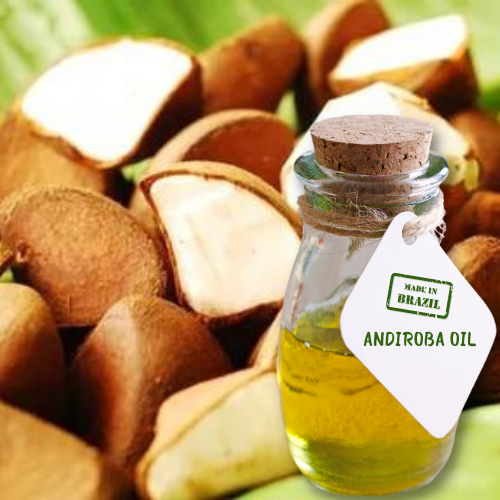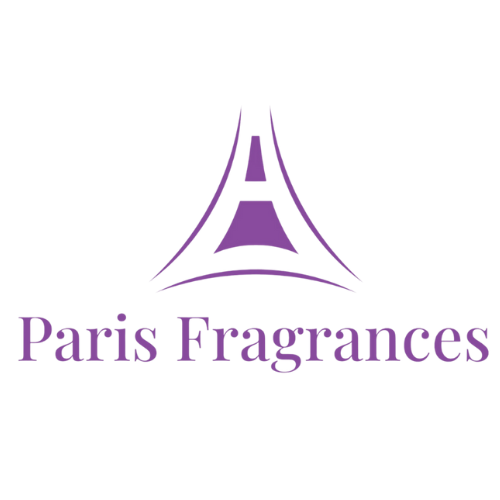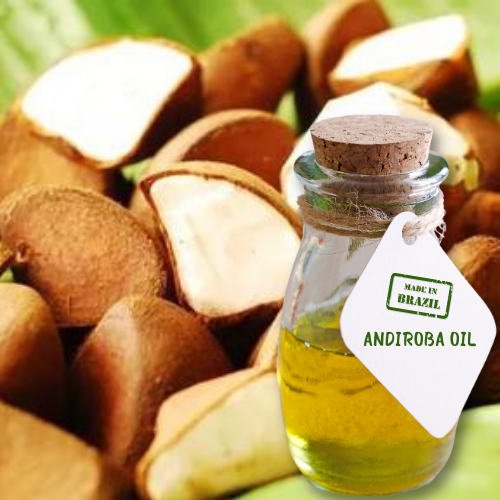Paris Fragrances USA
Andiroba Oil - Natural Unrefined - Wholesale
Andiroba Oil - Natural Unrefined - Wholesale
No se pudo cargar la disponibilidad de retiro
Extraction Method - Cold Pressed
Part of Plant Used: Seeds
Country of Origin: Brazil
Appearance: Light Yellow, to off-white
Smell: Strong musky smell similar to clarified butter.
Highlights:
- Skin Hydration
- Anti-Inflammatory
- Boots shine and strength of hair
- Andiroba virgin Oil is used in natural skin-care products, and by massage therapists.
The purchase of Virgin Andiroba Oil from the remote regions of the Amazon Forest helps to preserve the natural habitat and positively impacts the local economic conditions of the people.


All our oils, butters, and bioactive products are extracted from Amazonian plants using free chemicals methods (without the use of chemical reagents or solvents). This method of Cold Extraction allows producing high-quality products, such as oils, greases, soaps, and herbal extracts; also, it preserves the bioactive compounds that are found in the raw materials.
They are wild species that grow naturally in the Amazon rainforest, extracted sustainably without the use of pesticides and fertilizers. Our products are cruelty-free.
The product may be subject to variation in color, viscosity, smell and other factors depending on the harvesting and local temperature.
The product may be subject to variation in color, viscosity, smell and other factors depending on the harvesting and local temperature. If solid, place bottle in hot water to liquefy.
Paris Fragrances is not liable for misuse in handling our products nor are we responsible for the final result of your product. See our store policy page
Do you know?
This species is a Neotropical tree that occurs in southern Central America, Colombia, Venezuela, Suriname, French Guiana, Brazil, Peru, Paraguay, and the Caribbean islands. In Brazil, it is found from sea level to 350 m elevations, throughout the Amazon basin, forests and on land that is temporarily flooded, along rivers and streams and near the mangroves. The seeds float and can be dispersed by water. However, in forests, most fruits and seeds are found under the parent tree. The seeds are eaten by rodents, armadillos, peccaries, pacas, deer, agoutis, etc. The origin of the name andiroba is from nhandi (oil) and robs (bitter). Andiroba belongs to the same family as the mahogany and cedar tree and is highly demanded by sawmills because it is very resistant to insect attacks.
Individuals of andiroba can reach 30 meters in height and grow well in different environments, such as flooded areas. A mature tree can produce up to 120 kg of seeds per year (average 50 kg/year and tree). The seeds contain 43% fat. To produce a liter of oil, using rudimentary methods, 12 kg of seeds are needed. To extract the same amount, a mechanical press requires only 4 kg of dry seeds and only 3 kg of seeds are needed when using chemical solvents. The amount of oil that can be produced from the seeds of one andiroba tree can reach 10 liters per year, using rudimentary methods, and up to 30 liters using industrial techniques.
5.0 / 5.0
(1) 1 reseñas totales
Share
Characteristics
Characteristics
Uses
Uses
Documentation
Documentation
Shipping
Shipping
We want to ensure a smooth shipping experience for your order, and we usually ship via UPS or USPS. Please double-check that your address is accurate during checkout to avoid any delivery issues. Occasionally, a signature confirmation may be required upon delivery.
In case your order is returned to us as undeliverable, don't worry. We'll hold it in our showroom for 15 days, and we'll be happy to arrange a reshipment for you, though there will be a second shipping fee.
Once your package leaves our warehouse, we understand that we can't control its journey, and shipping delays can happen. We are not responsible for any such delays or errors caused by the shipping carrier.
Once USPS or UPS confirms the delivery of your order to your door or mailbox, we consider it delivered. However, if, in unfortunate circumstances, the box is stolen or lost after delivery, we kindly ask for your understanding that we cannot be held responsible.
Please note that certain extraordinary circumstances, like acts of God, which are beyond our control, such as natural disasters, may cause unforeseen interference with carrier routes, leading to shipping delays. Regrettably, we cannot be held responsible for such situations.
If, by any chance, you receive your order duplicated, please let us know, and we'll promptly send you a return label to send the extra products back to our warehouse.
If you have any questions or need further assistance, please don't hesitate to contact our friendly customer support team. We appreciate your understanding and look forward to serving you!
Return Policy
Return Policy
We take great care in inspecting all products before packing to ensure their quality. Upon receiving your order, please kindly check it for any damages. If you do come across any issues, please reach out to us at info@parisus.com within 48 hours of delivery, and we'll be glad to assist you.
Please note that any claims must be made within 30 days of the order being delivered. For eligible items that are unused and in saleable condition, we will provide a refund for the product price. However, shipping fees, duties, and taxes are non-refundable.
To maintain the high standards of our product offerings, we regret to inform you that essential oils, fragrance oils, vegetable oils, and butters cannot be returned or eligible for refunds.
We truly value your satisfaction and are here to ensure you have a positive experience with our products. If you have any questions or concerns, don't hesitate to contact us. We appreciate your understanding and support!



